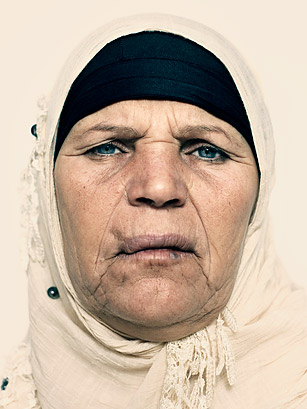
TIME's Rania Abouzeid spoke to Mannoubia Bouazizi, the mother of Mohammad Bouazizi, at her home in La Marsa, a section of Tunis. Here are excerpts from the interview.
TIME: After your son's act and the start of the protests, where were you during that period?
Mannoubia Bouazizi: I work in the fields. It was the olive-picking season. On that day, I got a telephone call from a relative who asked me where I was. I told him I was picking olives. He told me Mohammad isn't well, he's a little sick. Nobody told me that he burned himself or what kind of condition he was in. I told him when I left Mohammad was asleep at home. What do you mean Mohammad is a little sick? No, he's not. I called my brother and told him to come and get me because Mohammad was a little sick.
I went straight to the hospital. All his friends were already there. I was shocked, I couldn't understand why they were all there. I started screaming, "Mohammad, Mohammad,is he dead? Did he die?" They told me no, no, Mohammad is alright. He's O.K. They took him to the hospital in Sfax.
How soon after this did the protests start?
Exactly two days later, on the Friday in a big way. But when Mohammad's cart was still in front of the governorate and the fire was still burning Mohammad's body, some young men gathered around the governorate and started yelling at officials. At that very moment, at the same time that it had. They and his uncle, the man who raised him [her current husband] took Mohammad to the hospital, and others continued to throw stones at the governorate and yell and shout in front of it. Some of them told me they were saying, "Mohammad was oppressed, he was upset and downtrodden, and you are people who did not help him." "Where is the woman who hit him?" "You just want to humiliate us. Why didn't you open your door to him?"
Where were you when Sidi Bouzid was protesting?
During that whole period I was in the hospital, first in Sfax and then in Ben Arous. I didn't see any of it. His whole family was in Ben Arous. The only one of us who was in Sidi Bouzid was Basma [his 16-year-old sister]. For all that time, I was in the hospital. From when the revolution started and the people started taking to the streets and rioting, I and all of my family except Basma weren't present to see it. Basma would tell us what was happening in our town, that people were being beaten by the police and were attacking them back. We were kept informed by constant telephone calls.
In Ben Arous, I felt like I was locked into the hospital room, like the door was closed to me. They didn't want us to leave, even in the hospital in Sfax. They closed the door to us and wouldn't let us leave. When Ben Ali came to visit Mohammad, I told him I want to know what has happened to that woman, that woman that burned my son and burned my heart. I told him I am living but I am dead ... I told him, "Mr. President he was a street vendor, he'd move around and sell his produce. Why should she hit him with her gloves and humiliate him in the square." I told him my son was humiliated and beaten. He said, "We must send your son to France for treatment." He never did.
What is the message of Mohammad Bouazizi? What do you think the Arab people learned from Mohammad Bouazizi?
For 23 years, people lived with corruption, oppression, humiliation, with having to pay bribes. The message was that any person who has his livelihood threatened, who suffers because of officials, who is harassed by them, who is kept under their boot, who sees these officials who control the country, who do as they please, who do not let people like us live — Mohammad suffered a lot, he worked hard, but when he set fire to himself it wasn't about his scales being confiscated. It was about his dignity. Dignity before bread. Mohammad's first concern was his dignity. Dignity before bread.